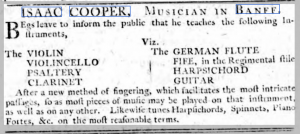Isaac Cooper, Banff’s own fiddle composer
The North-east of Scotland has a great tradition of fiddle music. And everyone should have heard of James Scott Skinner and William Marshall of Fochabers. Both of these had dealings with Banff, and wrote tunes for people in Banff. But Banff had its local fiddle composer, and quite a few of his tunes are still danced to.
He tried to earn his living in Banff as a musician. We first hear of him in 1783. He was tremendously versatile, and could teach any instrument you care to name. There is one of his advertisements above, but the list he submits in what we would call a press release would easily fill half this article. In 1784 he has become a dancing master as well, teaching, for example, the ‘Minuets de a Cour and the Cotillons’. He published a book of his own fiddle music, strathspeys and reels. He must have made a go of it, because he was still in Banff in 1810.
His career covers the time of the wars with France, and Isaac Cooper was active in the Volunteer movement. He is in fact Lieutenant (second in command) of the first company of the First Banff Battalion. (Lord Fife said this was the first volunteer battalion north of Edinburgh). In command was Captain Reid, deacon of the Incorporated Trades, and as it happened, Isaac was married to his sister. Years later the Reids gave Isaac’s fiddle and bow to the Banff Museum. They were worm-eaten then, and the Museum seems to have lost them.
The best-known of his tunes was Miss Forbes’s Farewell to Banff. Miss Herries Forbes of Balbithan (near Inverurie) had an aunt in Banff, so was well known here. More to the point, she married a Mr Urquhart of Meldrum, grandson of the first Earl Fife. Mr Urquhart was for 51 years Sheriff of Banffshire, and the couple lived on Low Street, so the Farewell was to a lady who came back.
Many years later, in the Banffshire Journal, it says “Isaac Cooper is said to have been a first-class violinist, and was supposed to have been originally in the class of society usually called ‘Gentlemen,’ but he ruined his prospects by his habits”. Whatever happened to his prospects, his tunes survived.



 unknown
unknown